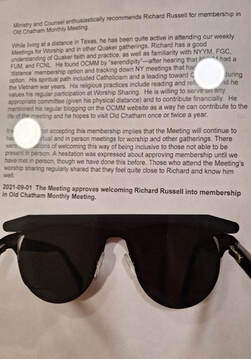|
I was in a conversation recently about the zeitgeist of our current time with a group of friends and was reminded of the film The Golden Compass. In that film Lyra, the main character, has an alethiometer, a compass-like artifact that reveals the truth.
What a wonderful invention!! In our time where truth seems to have become fungible, one alternate fact easily replacing an actual fact, we are living in one world but "sharing" different realities. What is the word for that? Schizophrenia? When I was growing up we did not "curate" our "self image" as teens. We were just kids being kids. Maybe when you went to write your college entrance exam you burnished up your image a bit, but it was not a full time job. It is as if there are two of us. Our real self and the one we "present" to the world. What I'm getting at is that there is a deep seated inauthenticity about the times we are living in. AI can generate fake video, fake photos, fake authorship and even deep fake voice prints of people saying stuff they never uttered. But who are we? And who do we need to be for our time? Here's a few queries that have come to my mind that may help clarify those two questions: 1. What can a human being authentically generate? 2. What can a human being, as a spiritual being, bring into existence from that which is God within us? 3. What is real? And What is truth? And what is our own internal Aleithiometer? Not easy questions but worth asking. At the end of the Golden Compass Lyra destroys the thing that tears children from their souls. As an observer of both history and society, it seems that we are in the process of crumbling. Old forms are breaking down so new forms can take their place. The essential element at the center of all of this is discernment. That good old Quaker value that has us pause and listen for wisdom. That might just be our Golden Compass. ~ Joseph OLejak
1 Comment
Image designed by freepik at https://www.freepik.com/ Useage information: https://support.freepik.com/s/article/How-can-I-use-free-images?language=en_US …is the greatest science-fiction novel ever written. The concept of the book is riveting, and its language rises to literary heights. What’s it about? Well, I won’t summarize the entire story; but at the end of the book the human children of the world become non-human entities that swarm across the Earth and destroy the planet. I’ll quote one character—Jan—an adult who remains on Earth and witnesses the apocalypse:
The buildings round me, the ground, the mountains—everything’s like glass—I can see through it. Earth’s dissolving…. The light! from beneath me—inside the Earth—shining upward, through the rocks, the ground, everything—growing brighter, brighter, blinding— The author concludes this description of a cosmic transformation: In a soundless concussion of light, Earth’s core gave up it’s hoarded energies. For a little while the gravitational waves crossed and re- crossed the solar system, disturbing ever so slightly the orbits of the planets…. There was nothing left of Earth: They (the non-human children) had leeched away the last atoms of its substance. It had nourished them, through the fierce moments of their inconceivable metamorphosis, as the food stored in a grain of wheat feeds the infant plant while it climbs towards the sun. (Childhood’s End, Copyright 1953, 1981,1990, 2001 by Arthur C. Clarke, electronic edition copyright 2012 by RosettaBooks, LLC) So, what does this science-fiction scenario have to do with Quakerism? Well, as a Christian Quaker, I believe that at death we return to God. But what does that mean? Does our soul dissolve in the Divine Substance, our individual memories and personality disappearing? That would be—I think—like the metamorphing children in Clarke’s story. Or do we preserve our individuality and continue to act in freedom although transformed by the Eternal Presence? For what it’s worth, the New Testament teaches the latter idea. In this dichotomy, I opt for the latter although I freely admit there’s no scientific evidence for the idea. Still, I can’t help quoting my favorite Bible verse, 1 Corinthians 13:12: “For now we see through a glass, darkly; but then face to face: now I know in part; but then shall I know even as also I am known.” (KJV) ~ Richard Russell Namely, Halley’s Comet, which returns to viewing distance from Earth every 76 to 79 years. When I saw the comet in 1986, it was not that spectacular; but by going to a dark-sky place called Enchanted Rock, I saw what looked like a star with a long line stretching away from it. The 1910 appearance, which my grandfather observed, was much more impressive, inspiring fear of being poisoned when the Earth passed through the comet’s tail.
Howard Thurman, the minister and civil rights leader, was fearful when he—as a young boy—looked at the 1910 comet; but young Thurman also had a mystical experience while viewing Halley’s: In that moment (of seeing the comet) something was touched and kindled in me, a quiet reassurance that has never quite deserted me. As I look back on it, what I sensed then was the fact that what stirred in me was one with what created and controlled the comet. It was this inarticulate awareness that silenced my fear and stilled my panic. https://www.plough.com/en/topics/faith/prayer/a-boy-and-a-comet So, what has all this to do with Quakers? Well, most Quakers believe in God/the Inner Light/Spiritual Power or at least a mystery at the heart of the universe. For many, if not most friends, Nature and natural phenomenon like the Comet evoke a mystical experience of that Spiritual Power, that Mystery. And Quakers believe in connectedness, the connectedness of Spirit with human beings and of human beings with one another. Halley’s Comet connects human beings across the generations. When I saw the comet in 1986, I thought of my beloved Grandfather. When the comet returns in 2061, my granddaughter Evie will—I hope—remember me. ~ Richard Russell The taproot of simplicity is to be found at that point in the life of a Friend when the realization comes that his or her inner and outer lives are connected, that for the inward life to continue to grow, there must be a response from the outward life. It is at that point where awareness dawns that spiritual knowledge itself comes from an open relationship between one’s inner and outer lives, and from a free movement between the two.
~ from Frances Taber’s Pendle Hill Pamphlet, Finding the taproot. https://pendlehill.org/product/finding-taproot-simplicity-movement-inner-knowledge-outer-action/ Quoted by Brian Drayton in his Midweek Meditation for Feb. 21 https://neym.org/events-calendar/2023/09/midweek-meditations ~ submitted by Richard Russell In ancient Rome, a victorious general would return to the city in a triumphal procession that included his army together with captives and spoils taken in the war being celebrated. But as the general rode through the city in a four-horse chariot, a slave standing behind him in the chariot would whisper in his ear, “Memento mori”—"Remember that you will die.”
In like fashion, Christians celebrate Ash Wednesday by receiving on their forehead ashes in the form of a cross while the priest says, “Remember you are dust, and to dust you shall return.” The Stoic philosophers of Greece and Rome counseled frequent meditation on one’s mortality, not as a grim habit, but as a realization that life is fleeting and should be lived to the fullest. In his Meditations, Marcus Aurelius, the Stoic Roman emperor, wrote, “You could leave life right now. Let that determine what you do and say and think.” The Daily Stoic (https://dailystoic.com/memento-mori/) explains the idea: Meditating on your mortality is only depressing if you miss the point. It is in fact a tool to create priority and meaning. It’s a tool that generations have used to create real perspective and urgency. To treat our time as a gift and not waste it on the trivial and vain. Death doesn’t make life pointless but rather purposeful. So, when I, a Christian Quaker, received the ashes this past February 14, I felt joy, not sadness—resolve, not helplessness. I recommend some version of Memento Mori to all Friends—Christian, Stoic, Buddhist, Sufi, or whatever spiritual path a Friend has chosen. ~ Richard Russell Photo by Richard Russell I’m usually skeptical of people who fear that machines and artificial
intelligence will diminish our humanity; but, today, it occurred to me that they may have a point. I went to an eye clinic that specializes in cataract surgery. For two hours I was shuttled from one machine to another. The medical assistants who operated the machines worked with a speed that’s not possible for me in my old age. These young women (Where were the males?) almost seemed like appendages to the machines, enabling the fast and efficient operation of these instruments but largely ignoring me except as an object for analysis. Friends are different. We’re usually slow and very interested in the humanity and personality of those we deal with. And when I say we’re slow, I mean slow. It’s a good thing that Quakers are pacifists or pacifist sympathizers because we could never make the quick decisions necessary on a field of battle. Of course, I favor “slow” but am sometimes irritated by the length of time it takes to get an item from discussion to committee to Business Meeting and possible approval. Still, Quaker “slow” is better than modern “fast.” Quaker process preserves our humanity and respects the Inner Light Within. ~ Richard Russell https://unsplash.com/photos/caution-children-playing-graffiti-oqCRCYUiJpw https://unsplash.com/license Upon reflection of my time in South Africa I can clearly say that the vestiges of Apartheid are still indelibly upon the native people of South Africa. At the end of the era in which the struggle for racial equality reached its peak (around 1990) the Afrikaaner government called the ANC a terrorist organization. The man who would lead the ANC was jailed on Robbin Island breaking big stones into little stones.
One mans terrorist is another mans freedom fighter. The reality is that Nelson Mandela was a bomb thrower before he was the president of the ANC and asked for Truth and Reconciliation. The United States has had a similar history. Thankfully, the civil rights movement here was non-violent. However, the generational damage to people of color is deep. Can you believe the civil rights act was only passed in 1964? There is still much work to be done. The election of a black president has not put us in a post-racial era. If anything, we are dealing with a similar kind of backlash that happened after reconstruction in the post civil war period. What we are seeing unfolding in Palestine is also apartheid. And in my way of thinking it is the worst kind of apartheid because it comes on the heels of one of the greatest atrocities in human history -- the holocaust. Israelis ought to know better based on their history. Germany treated jewish people badly because they were deemed a security threat. South Africa treated blacks and colored people badly because they were deemed a security threat. The US treats blacks and people of color badly to this day because they are deemed a security threat. Israel treats Palestinians badly because they are deemed a security threat. One has to ask why this madness keeps happening? One has only to look at income inequality and the answer becomes abundantly clear. Humans can be very generous if they want to be ... or they can act in the most heinous ways. All forms of apartheid, in my humble opinion, are myriad forms of selfishness cloaked under the giant umbrella of "security." And by selfishness I mean the unwillingness to share economic opportunity. For 300 years Europeans and Americans enslaved black people to generate enormous wealth on plantations. The English (and then the Afrikaaners afterward) used apartheid to separate people from their land and self sufficiency in order to get them into wage slavery. Today the average wage there is $1.50 per hour. Germans were sold a bill of goods (after the treaty of Versailles) that the Jews were the source of their economic problems when in fact it was just garden variety greed and expansionism from WWI that caused the economic collapse of Germany in the 1920's and 1930's. Here's a question: how desperate do you think a group of people has to be to start a war they know they will lose just to bring the attention of the world to their dire and extremely tragic living situation? The queries we could be engaged in at this moment in history are:
~ Joseph Olejak I tend to be suspicious of martyrs whose suffering may be needless and useless in attaining the ends of that suffering. But I do find heroic the suffering of the Quakers imprisoned after the March on the Pentagon in 1967. In protesting the Vietnam War, some of these Friends refused to eat or drink and were fed intravenously as a consequence. Others refused to wear prison clothing and were thrown naked into freezing, cramped cells. Norman Mailer has written about them in his book, The Armies of the Night (1968, pp. 287-288, New York: Signet):
Did they pray, these Quakers, for forgiveness of the nation? Did they pray with tears in their eyes in those blind cells with visions of a long column of Vietnamese dead, Vietnamese walking a column of flame, eyes on fire, nose on fire, mouth speaking flame, did they pray, “O Lord, forgive our people for they do not know, O Lord, find a little forgiveness for America in the puny reaches of our small suffering….” The prayers are as Catholic as they are Quaker, and no one will know if they were ever made, for the men who might have made them were perhaps too far out on fever and shivering and thirst to recollect, and there are places no history can reach. But if the end of the March took place in the isolation in which these last pacifists suffered naked in freezing cells, and gave up prayers for penance, then who was to say they were not saints? And who to say that the sins of America were not by their witness a tithe remitted? ~ submitted by Richard Russell Christianity-derived-groups often emphasize the importance of individuals believing specific stated ideas or concepts. Many of these groups are made up of individuals who all are convinced, or willing to agree, on the stated ways to God, or heaven, or that make us part of the group in good standing. This may not be a good metaphor, but I often feel there is a box, and all those who agree to get into that box are part of the group and receive its benefits (belonging, sense of community, sense of purpose larger than themselves...).
We Friends have a little of that, but I have always felt that among Friends I am not in a community defined by the box, but by a common amorphous understanding to explore together what it means for the Larger-Than-Us, the Spirit, God, the teachings of Jesus... to be within us. And, to live a life that recognizes everyone/everything beyond me is related to me by virtue of the Larger-Than-Us, the Spirit, God, the teachings of Jesus, also being in everyone else (whether recognized or not, and despite whatever language they speak.) Yes, the Quaker movement came out of a Christian context, and many of us have discovered that Jesus, though he came out of a Jewish context, interpreted his world in ways of wisdom, risk, love, and acknowledgment of the value of people whom the larger culture of his time dismissed as having little worth. People such as poor widows, Samaritans, gentiles, cripples, ... I know many people who have been wounded by other’s use of Jesus and the “Christian” approach to exclude, condem, disdain, judge, or bore them. I also know a good number of these folks feel in their bones that humans have a spiritual, moral, ethical side. And I know many folks whose lives have been utterly changed at learning about Jesus’ message as it speaks to their spiritual, moral, ethical experiences and lives. I love that Quakerism bucks the mainstream, even if we, because it surrounds us, often slip back into wider cultural patterns. It encourages us to not be swayed by false authorities. It suggests people very different from us have elements of the Truth we may not have considered, so listen to them rather than judging them as “not like me.” It offers space for the still, small voice, rather than filling up time and space with words, music, symbolism (not that these don’t have value). Quakerism highlights the ineffectiveness of violence as a means to convince, and insists love is the first motion, working to dismantle the divide between being spiritual in “church” and living what the spiritual means to us "out in the world." As such, might we as Old Chatham Meeting Friends resist cultural tendencies to: -Get into camps -Think that if a way is not right for me, it is wrong -Assume people don’t change over time, or only if they are forced to -Hold a notion that everything has two poles: right/wrong, true/false, male/female, win/lose, mine/yours, good/bad, ... -Blame, shame, and punish rather than seek to understand and heal past traumas, experiences, and reasons for hurtful behaviors Instead can we aspire to treat other humans and non-humans as we would love to be treated: we are on a journey, we come from different experiences, we have special gifts that help us where we are, and we are reminded that love is the first motion? We Friends can start with ourselves in working against a polarized world: let’s continue to talk and share our stories, with joy in the differences, with curiosity about what doesn’t speak to us, with compassion for ourselves and those things that bother us, and with a deep understanding of how biodiversity, geologic-diversity, aquatic-diversity, atmospheric diversity, energetic diversity are central and fundamental characteristics of this earth...not to mention the rest of the universe out there. Below are some thoughts by other Friends on diversity of thought and belief among us: My conviction led me to adhere to the sufficiency of the light within us, resting on truth for authority, not on authority for truth. It is time that Christians were judged more by their likeness to Christ than their notions of Christ. Were this sentiment generally admitted we should not see such tenacious adherence to what men deem the opinions and doctrines of Christ while at the same time in every day practise is exhibited anything but a likeness to Christ.” ~ Lucretia Mott, circa 1850 Love was the first motion, and then a concern arose to spend some time with the Indians, that I might feel and understand their life, and the Spirit they live in, if haply I might receive some instruction from them, or they be in any degree helped forward by my following the leadings of Truth amongst them. And as it pleased the Lord to make way for my going at a time when the troubles of war were increasing and when by reason of much wet weather travelling was more difficult than usual at that season, I looked upon it as a more favourable opportunity to season my mind, and bring me into a nearer sympathy with them. And as mine eye was to the great Father of Mercies, humbly desiring to learn what his will was concerning me, I was made quiet and content. ~ John Woolman, 1763 Can we settle the question, ‘Is the Society of Friends Christian or not?’ In the historical sense the answer is Yes: but that does not preclude the possibility that we may now be called to a new and wider perception of the Truth. We have the witness of the Society itself, as well as the example of Jesus, against turning yesterday’s inspiration into today’s dogma. Today’s world-wide knowledge of people and their religions does present a challenge which our universalists are right to try to meet – just as our Christians are right to remind us that the insights of the past must not lightly be thrown away. It may be valuable to live for a while in the tension between the universal and the specific; and if so, there may be a special vocation here through which our Society (with its tradition of respect for the divine Seed in everyone) can minister to the church at large. Or it may be that a synthesis is possible, once we can agree on what is essential to being a Christian. ~ John Lampen, 1985 From the beginning the Quaker Christian faith has had a universal dimension. George Fox saw the Light ‘shine through all’ and he identified it with the divine Light of Christ that ‘enlightens every man that comes into the world’ (John 1:9). He pointed out, as did William Penn in greater detail, that individuals who had lived before the Christian era or outside Christendom and had no knowledge of the Bible story, had responded to a divine principle within them. In these terms, all Quaker Christians are universalists. Obedience to the Light within, however that may be described, is the real test of faithful living. ~ Alastair Heron, Ralph Hetherington and Joseph Pickvance, 1994 Post by Jens Braun An Old Chatham Friend recently remarked that structure requires space. What if Good requires Evil? Put theologically, what if God has to struggle against Evil? Many Quakers complain about all their efforts toward peace and justice bringing few or no results. But if God and we as God’s instruments have to fight against Evil, is it not logical that the strength of Evil makes our progress toward the Good slow and arduous. In mythical terms, the angels are confronting the power of the Devil. Perhaps we can be encouraged by the thought that Good will eventually win out if only we persist, if only we don’t lose faith. ~ Richard Russell |
This blog was set up to post content of interest to Old Chatham Quaker members and attenders. Posts related to one's own personal spiritual journey, reports based on interviews with others, and reflections on Quaker-related topics are welcome. Posts by individuals are personal expressions and do not necessarily reflect those of the Meeting as a whole.
Guidelines for posting on website blog:
Submit to member of Communications committee; committee has editorial oversight over all content posted on the Meeting website. Be respectful of the nature of vocal ministry given in Meeting for Worship or other settings and any private conversations about spiritual matters. Cite source of any image or other external content submitted. Archives
July 2024
Categories |





 RSS Feed
RSS Feed